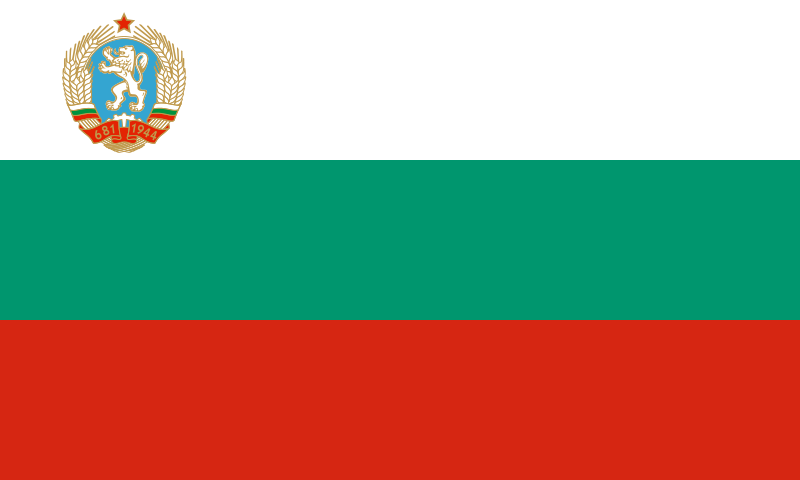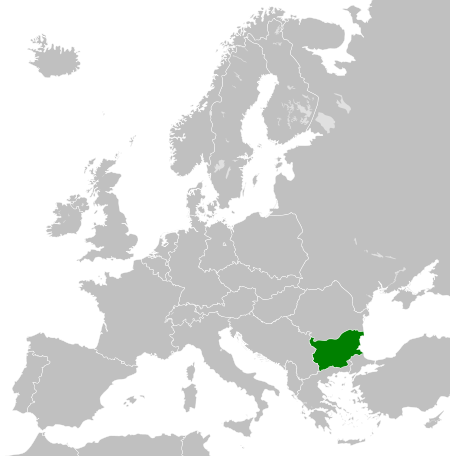<Back to Index>
- Member of the COMECON People's Republic of Bulgaria, 1949
PAGE SPONSOR


The People's Republic of Bulgaria (PRB) (Bulgarian: Народна република България (НРБ), Narodna republika Balgariya (NRB)) was the official name of the Bulgarian communist republic that existed from 1946 to 1990, when the Bulgarian Communist Party (BCP) was ruling together with the 'oppositional' National Agrarian Party. Bulgaria was viewed in the West as a satellite state of the Soviet Union, part of Comecon and an Eastern Bloc country, and a Soviet ally during the Cold War, a member of the Warsaw Pact.
In 1989 democratic reforms were initiated after some few years period of unspoken liberalization and after in the autumn of 1989 the long ruling Todor Zhivkov was removed from power in a BCP congress. In 1990 BCP changed its name to Bulgarian Socialist Party (BSP) and adopted a center - left political ideology due to Georgi Parvanov, then political historian at the BCP Institute, in place of Marxism - Leninism. Following the first free elections since 1931 (won by the BSP), the country's name was changed to Republic of Bulgaria.
Although the Kingdom of Bulgaria changed its alliance and declared war on Nazi Germany on September 7, 1944, on September 9 a coup d'état, backed by Red Army troops, installed a new government led by the Communist Fatherland Front (FF).
In 1946, Georgi Dimitrov, a close friend of Joseph Stalin, became prime minister. The first years were accompanied by repressions over opposition. The same year a referendum was held, on which 95% of voters declared themselves against the monarchy and supported the establishment of a republic. Almost immediately after that Bulgaria was declared a people's republic. The young Tsar Simeon II fled the country with his sister and mother. Vasil Kolarov was head of state until the adoption of a new constitution in 1947.
In 1948 - 49, Orthodox, Muslim, Protestant and Roman Catholic religious organizations were restrained or banned. The Orthodox Church of Bulgaria somehow continued functioning but was restricted and later infiltrated with communist functionaries.
In 1950, after the death of Vasil Kolarov and that of Georgi Dimitrov a year earlier, Vulko Chervenkov became Prime Minister. Chervenkov started a process of rapid and forceful industrialization. Yet, Chervenkov's support base even in the Communist Party was too narrow for him to survive long once his patron, Stalin, was gone. In March 1954, a year after Stalin's death, Chervenkov was deposed as Party Secretary with the approval of the new leadership in Moscow and replaced by the youthful Todor Zhivkov. Chervenkov stayed on as Prime Minister until April 1956, when he was finally dismissed and replaced by Anton Yugov.
Todor Zhivkov ruled Bulgaria for the next 33 years, being completely loyal to the Soviets but pursuing a more moderate policy at home. Relations were restored with Yugoslavia and Greece, the trials and executions of Traicho Kostov and other "Titoists" (though not of Nikola Petkov and other non - Communist victims of the 1947 purges) were officially denounced. A limited degree of freedom of expression was restored and the persecution of the Church was ended.
The upheavals in Poland and Hungary in 1956 did not spread to Bulgaria, but the Party placed firm limits and restraints on intellectual and literary freedom to prevent any such outbreaks. In the 1960s some economic reforms were adopted, which allowed the free sale of production that exceeded planned amounts. The country became the most popular tourist destination for the Eastern Bloc people. Bulgaria also had a large production basis for commodities such as cigarettes and chocolate, which were hard to obtain in other socialist countries.
Yugov retired in 1962, and Zhivkov then became Prime Minister as well as Party Secretary. He survived the Soviet leadership's transition from Khrushchev to Brezhnev in 1964, and in 1968 again demonstrated his loyalty to the Soviet Union by taking a formal part in the invasion of Czechoslovakia; that is, he sent a limited number of troops for attendance but not for actually taking part in the bringing down of the Prague Spring. At this point Bulgaria became generally regarded as the Soviet Union's most loyal Eastern European ally.
In 1971, with the adoption of a new Constitution, Zhivkov promoted himself to Head of State (Chairman of the State Council) and made Stanko Todorov Prime Minister.
Although Zhivkov was never in the Stalinist mold, by 1981, when he turned 70, his regime was growing autocratic but brought also some social and cultural liberalization and progress led by his daughter Lyudmila Zhivkova, who, unlike her father, did not receive approval of communist functionaries because of her pro - Western attitudes.
Before the fall of communism this autocracy was shown most notably in a campaign of forced assimilation against the ethnic Turkish minority, who were forbidden to speak the Turkish language and were forced to adopt Bulgarian names in the winter of 1984. The issue strained Bulgaria's economic relations with the West. The expelling of 300,000 Turks caused a significant drop in agricultural production in the southern regions due to the loss of labor force.
By the time the impact of Mikhail Gorbachev's reform program in the Soviet Union was felt in Bulgaria in the late 1980s, the Communists, like their leader, had grown too feeble to resist the demand for change for long. Liberal outcry at the breakup of an environmental demonstration in Sofia in October 1989 broadened into a general campaign for political reform. More moderate elements in the Communist leadership reacted promptly by deposing Zhivkov and replacing him with foreign minister Petar Mladenov on November 10, 1989.
This swift move, however, gained only a short respite for the Communist Party and prevented revolutionary change. Although Mladenov promised to open up the regime, demonstrations throughout the country brought the situation to a head. On December 11, Mladenov went on national television to announce the Communist Party had abandoned power. On January 15, 1990, the National Assembly formally abolished the Communist Party's "leading role." In June 1990, the first free elections since 1931 were held, thus paving Bulgaria's way to multiparty democracy. Finally in mid November 1990, the National Assembly voted to change the country's name to the Republic of Bulgaria and removed the Communist state emblem from the national flag.
People's Republic of Bulgaria was a single party Communist state. The Bulgarian Communist Party created an extensive nomenklatura on each organizational level. The constitution was changed several times, with the Zhivkov Constitution being the longest lived. According to article 1, "The People's Republic of Bulgaria is a socialist state, headed by the working people of the village and the city. The leading force in society and politics is the Bulgarian Communist Party."
The PRB functioned as a one party people's republic, with the People's Committees representing local self government. Their role was to exercise Party decisions in their respective areas, and in the meantime to rely on popular opinion in decision making. In the late 1980s, the BCP had an estimated peak of 1,000,000 members - more than 10% of the population.
After Bulgaria was proclaimed a people's republic in 1946, the military rapidly adopted a Soviet military doctrine and organization. The country received large amounts of Soviet weaponry, and eventually established a domestic military vehicle production capability. By the year 1988, the Bulgarian People's Army (Българска народна армия) numbered 152,000 men, serving in four different branches - Land Forces, Navy, Air and Air Defense Forces, and Missile Forces.
The BPA operated an impressive amount of equipment for the country's size - 3,000 tanks, 2,000 armored vehicles, 2,500 large caliber artillery systems, over 500 combat aircraft, 33 combat vessels, as well as 67 Scud missile launchers, 24 SS-23 launchers and dozens of FROG-7 artillery rocket launchers.
The economy of the PRB was a centrally planned economy, similar to those in other COMECON states. In the mid 1940s, when the collectivization process began, Bulgaria was a primarily agrarian state, with some 80% of its population located in rural areas. Production facilities of all sectors were nationalized, although it was not until Vulko Chervenkov that private economic activity was completely scrapped.
Despite negative effects in some other countries, the productivity of Bulgarian agriculture increased rapidly after collectivization. Large scale mechanization resulted in an immense growth in labor productivity. A vast amount of government subsidies were spent each year to cover the losses from the artificially lowered consumer prices.
Chervenkov's Stalinist policy led to a massive industrialization and development of the energy sector, which is one of Bulgaria's most advanced economic sectors to date. His rule lasted from 1950 to 1956, and saw the construction of dozens of dams and hydroelectric power plants, chemical works, Elatsite gold and copper mine, and many others. The war time coupon system was abolished, healthcare and education were made free. All this was achieved with strict government control and organization, prisoner brigades from the labor camps and the Bulgarian Brigadier Movement - a youth labor movement where young people worked "voluntarily" on construction projects.
In the 1960s, Todor Zhivkov introduced a number of reforms which had a positive effect on the country's economy. He preserved the planned economy, but also put emphasis on light industry, agriculture, tourism, as well as on Information Technology in the 1970s and the 1980s. Surplus agricultural production could be sold freely, prices were lowered even more, and new equipment for light industrial production was imported. Bulgaria also became the first Communist country to purchase a license from Coca - Cola in 1965, the product had the trademark logo in Cyrillic.
Despite being very stable, the economy shared the same drawbacks of other countries from Eastern Europe - it traded almost entirely with the Soviet Union (more than 60%) and planners did not take into account whether there were markets for some of the goods produced. This resulted in surpluses of certain products, while other commodities were in deficit.
Apart from the Soviet Union, other main trade partners were East Germany and Czechoslovakia, but non - European countries such as Mongolia and various African countries were also large scale importers of Bulgarian goods. The country also enjoyed good trade relations with various non - Communist developed countries, most notably West Germany and Italy. In order to combat the low quality of many goods, a comprehensive State standard system was introduced in 1970, which included precise and strict quality requirements for all sorts of products, machines and buildings.
The People's Republic of Bulgaria had an average GDP per capita for an Eastern Bloc country. At least on paper, average purchasing power was one of the lowest in the Eastern Bloc, mostly due to the larger availability of commodities than in other socialist countries. Workers employed abroad often received higher payments, thus could afford a wider range of goods to purchase. According to official figures, in 1988 100 out of 100 households had a television set, 95 out of 100 had a radio, 96 out of 100 had a refrigerator, and 40 out of 100 had an automobile.
Culture in the People's Republic of Bulgaria was strictly controlled and regulated by the government, although there have been some periods of liberalization (meaning entrance in Bulgaria of Western literature, music, etc.). The thaw in intellectual life had continued from 1951 until the middle of the decade. Vulko Chervenkov's resignation and the literary and cultural flowering in the Soviet Union created expectations that the process would continue, but the Hungarian revolution of fall 1956 frightened the Bulgarian leadership away from encouragement of dissident intellectual activity.
In response to events in Hungary, Chervenkov was appointed minister
of education and culture; in 1957 and 1958, he purged the leadership of
the Bulgarian Writers' Union and dismissed liberal journalists and
editors from their positions. His crackdowns effectively ended the
"Bulgarian thaw" of independent writers and artists inspired by
Khrushchev's 1956 speech against Stalinism. During the later years of
communist rule, nationalism became a doctrine that the ruling party
promoted.